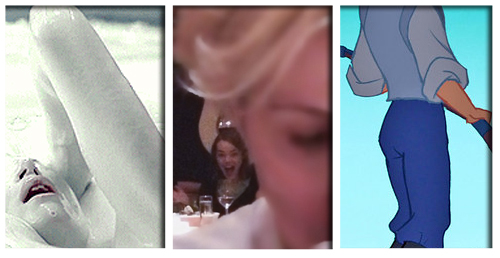Vanity Fair Melissa McCarthy and other funny ladies in talks for Ghostbusters reboot. I'm rooting for Jillian Bell myself who is mentioned. Yay.
Buzzfeed a definitive ranking of Disney Prince butts - as great as it sounds though I'd place Prince Phillip higher because my imagination works (I love that former Prince BD Wong even replied to his ranking on Twitter)
Vulture let us all worship Charlize Theron who has demanded (and been given) equal pay to her male co-star for The Huntsman. It's not like people went to the first movie for Hemsworth...Insane. Sexism by the numbers.
The Film Grapevine Birdman and the unexpected virtue of Contrivance
A Socialite Life Andrew Garfield and Emma Stone photobomb someone actually trying to take a photo of them

Slate on why Wes Anderson movies have never been popular with the Academy Awards before (presumably) now. Fairly good reasoning
MNPP Wet Hot American Summer will become a Netflix series and the original cast is all returning
RogerEbert.com on the women in Selma: the unsung heroines of the movement
THR Samuel Goldwyn Jr dies
Theater Mania The Color Purple is coming back to Broadway (already?) with Jennifer Hudson as Shug
Good Long Reads
IndieWire great piece on the definitions of patriotism and exceedingly pro-gun messaging of American Sniper. Please do not let this film be nominated for Best Picture. It's just not what we need right now...especially given how many people have been killed by guns lately in the States...and still no gun reform.
Grantland Wesley Morris on Selma. Love this sprawling, provocative review / thinkpiece. I've been totally appalled and confused myself at the way the media has latched on to the Lyndon B Johnson depiction but Morris makes a great point here that helps clarify, for me, the anger and nitpicking:
A quick survey of film history suggests that the depiction of racial themes in America has always been the province of white directors, whether it’s something as spectacularly diabolical as D.W. Griffith’s The Birth of a Nation or the antebellum revenge of Quentin Tarantino’s Django Unchained. These great-man movies tend to reflect the aspirations and identities of the people who make them, which is how so many stories ostensibly about black life wind up with white interpolators. DuVernay understands the fraught, imbalanced legacy a film like this pulls her into, and she’s been as fair as she needs to be. This is not a film that undermines or questions Johnson’s ultimate contributions to the improvement of black life in this country. (It very easily could have mentioned the two decades in Congress he spent opposing civil rights legislation.) Inasmuch as there are villains, they are Wallace, Hoover, and Selma’s sheriff, Jim Clark. But because this isn’t Johnson’s story, those accustomed to seeing the president as hero (or protagonist) ultimately seem dismayed by how little of the president there is here.
The bold is mine, not Morris's. People who are angry about Lyndon B Johnson's depiction really ought to look beyond the myth and think about reality. And once they do, rather than be disappointed, they should be as generous as DuVernay is who depicts him as an imperfect man who makes a great progressive decision which changes history.